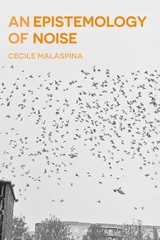
Cécile Malaspina
Pour commander
About An Epistemology of Noise
What do we understand ’noise’ to be ?
The term ’noise’ no longer suggests only aesthetic judgement, as in acoustic or visual noise, and is now relevant to domains as varied as communication theory, physics and biology. This trans-disciplinary usage leads to confusion and complication, and reveals that the question of noise is a properly philosophical problem.
Presenting an analysis of the rising interest in the notion of noise, this book investigates if there can be a coherent understanding of what it is, that can be effectively shared among the natural and human sciences, technology and the arts. Drawing the philosophical consequences of noise for the theory of knowledge, Malaspina undertakes a philosophical revaluation of Shannon and Weaver’s theory of ’information entropy’ ; this forms the basis upon which to challenge the common idea that noise can be reduced to notions of error, disorder or disorganization. The wider consequences of this analysis relate the technological and scientific aspect of noise, with its cultural and psycho-social aspects. At the heart of Malaspina’s argument is the contestation of the ground upon which we judge and distinguish noise from information and finally the exploration of its emancipatory potential.
Table of contents
Foreword by Ray Brassier Acknowledgements Note on Text List of Abbreviations
Introduction
Part 1 Concepts : Information Entropy, Negentropy, Noise
I How to Draw the Line between Information and Noise
II Entropy as ’Freedom of Choice’
III Information Entropy and Physical Entropy
IV The Idea of ’Potential Information’
V Physical Concepts of Information and Informational Concepts of Physics
VI Information as Process Rather Than Content
VII To Think about Information as a Process of Individuation
VIII Redundancy and Necessity
IX Logic and Freedom of Choice
X Noise as Spurious Uncertainty
XI Negentropy
XII Complexity on the Basis of Noise
XIII The Astigmatism of Intuition
XIV The Path of Despair
Part 2 Empirical Noise
I On the Transduction of the Concept of Noise
II Accidental Information, Predictable Noise
III Ready-Made Information
IV Cosmic Background Radiation
V Noise in the Gap between Narratives
VI Noise in Finance
VII Statistics : The Discipline of the Prince
VIII The Man without Qualities
IX Noise Abatement : The Dawn of Noise
X Noise Pollution
XI Toxic, Viral, Parasitic
Part 3 The ’Mental State of Noise’
I The Crossroads : Mathematical, Technical, Empirical and Subjective Noise
II Internal Chaos, Terror and Confusion
III The Vicious Whir of Sensations
IV Keat’s Negative Capability
V Closure to Noise and the Paradox of the Declining Life
VI The Catastophic Reaction to Noise
VII Anxiety
VIII Order
IX Control
X The Helmsman Metaphor : Kybernetes
XI The Helmsman in Plato’s Alcibiades Dialogue
Bibliography
Index
Reviews
“This is one of the freshest intellectual works I have read in recent years. If you did not previously recognize the philosophical significance of Claude Shannon, Warren Weaver, and Norbert Wiener, you will after reading this book. Shannon’s paradoxical claim that information and noise are both forms of entropy is revived by Malaspina and developed with ideas drawn from Gilbert Simondon and Nicholas of Cusa. The result is a challenging and compelling experience for the reader, who will want to study this book multiple times.” – Graham Harman, Distinguished Professor of Philosophy at Southern California Institute of Architecture in Los Angeles, USA,
“The chapters that form this book are like cuts in a diamond, the precision of which is a thing of beauty. Bringing presuppositions to the fore, little is taken for granted when approaching noise and how to understand it. This is a philosophy of noise that is ultimately freeing and demands to be shared.” – Yve Lomax, Senior Research Tutor in Photography and Fine Art, Royal College of Art, UK,
“The received view that we now live in information societies obscures a more unsettling premise. For noise is not just intrinsic to information : as Cecile Malaspina contends, noise is rather the very basis of information. Information societies are then noise societies. This startling insight requires the resetting-or rather the upsetting- of basic categories across the board : for communication, sound, physics, biology, social organisation and, as Malaspina argues, of categorization itself. Noise is therefore primary and significant, yet its theorization is a demanding and necessarily transdisciplinary task. Epistemology of Noise attends to that task with rigour and precision. As such, Malaspina has written an establishing text for a new uncontainable field of noise studies.” – Suhail Malik, Reader in Critical Studies, Goldsmiths, University of London, UK,
“This important study offers a rewarding exploration of its subject, not the least by revealing the deeper philosophical underpinnings of the mathematical and scientific theories of information and noise. The book rightly places them in complex relationships to each other, and against an uncritical opposition between them that has prevented us from understanding the nature of these relationships, and of noise and information themselves, for so long.” – Arkady Plotnitsky, Distinguished Professor of English and Director of Theory and Cultural Studies, Purdue University, USA,



